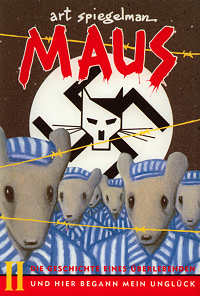 So yes, after resisting Far to Go because it was “another Holocaust novel,” I immediately picked up another Holocaust novel right afterwards. But this one, too, brings a fresh perspective. Maus, as most people know, is one of the most critically-acclaimed graphic novels of all time, perhaps the first graphic novel to be treated with the same respect accorded to “real” books. After having heard raves about it for years, I leafed through a copy someone had brought into my classroom and decided I had to read it. Conveniently, I’d just been given a Chapters gift card, and wanted to buy something that I wouldn’t prefer to download on my e-reader. A graphic novel seemed like just the thing.
So yes, after resisting Far to Go because it was “another Holocaust novel,” I immediately picked up another Holocaust novel right afterwards. But this one, too, brings a fresh perspective. Maus, as most people know, is one of the most critically-acclaimed graphic novels of all time, perhaps the first graphic novel to be treated with the same respect accorded to “real” books. After having heard raves about it for years, I leafed through a copy someone had brought into my classroom and decided I had to read it. Conveniently, I’d just been given a Chapters gift card, and wanted to buy something that I wouldn’t prefer to download on my e-reader. A graphic novel seemed like just the thing.
Maus is the story of Speigelman’s father Vladek, a survivor of Auschwitz. Many story threads are woven into this ambitious novel: the story of how a family of prosperous Polish-Jewish business owners become penniless refugees, fleeing for their lives; the story of a woman — Vladek’s wife Anya — who survived the war but was never able to fully recover from her losses; the story of a son dealing with his often-annoying aging father, and the frustrated love between the two.
The graphic-novel presentation is what makes the story fresh, though Spiegelman’s evocation of the rhythms of his father’s voice and accent require no visual illustration. Portraying the characters as anthropomorphized animals (the Jews are mice; the Germans cats; the Poles pigs; Americans dogs; French frogs, etc) allows us to step back just enough to see the familiar in a new light, and also allows for some neat tricks of visual storytelling. My favourite picture in the whole book is a scene in which Vladek tells how he and Anya were hiding from the Nazis in Poland. It was easy, he says, for him to blend in, but Anya looked more Jewish and he was afraid she’d be recognized. In the drawing, Vladek wears his Polish “pig” mask, but Anya, beside him, not only looks like a mouse but has a long, very obvious mouse-tail trailing out from the back of her coat along the street behind her. Little touches like that make this book a constant delight, even when the subject matter is so very disturbing. I will admit to having had some skepticism about graphic novels as a way of telling serious stories before this, but not anymore. Maus (which my thirteen-year-old son is now reading) is simply a brilliant book.
Did you buy/read the sequel too? (Maus II, I believe). It’s very powerful as well. Sometimes they’re sold as a boxed set. I taught Maus several times in my classes. very moving.
Yes, I read them both — just reviewed them under the one title for convenience. In fact the copy I picked up in my classroom had them both bound in the same volume, but I couldn’t get that, so I got the box set. Both great.